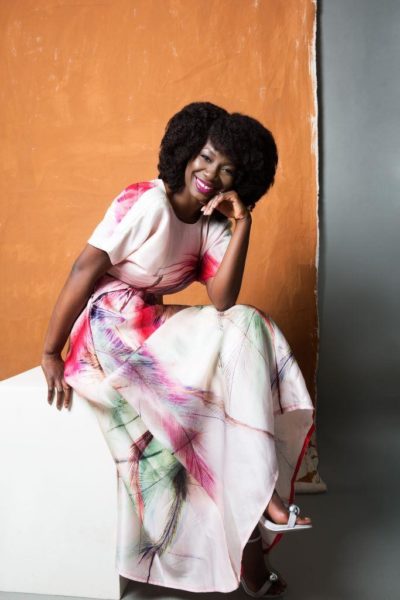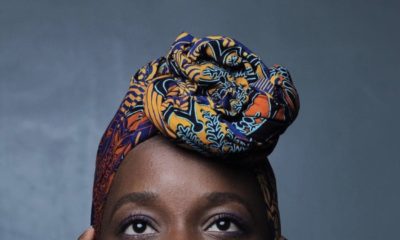Features
Through Her Eyes…with Titilope Sonuga: The Girl Next Door

Photo Credit: Lakin Ogunbawo
She Will Connect is an amazing initiative by Intel aimed at empowering and inspiring girls and women. BellaNaija is excited to share ‘Through Her Eyes… with Titilope Sonuga“. Titilope is Intel She Will Connect ambassador for Nigeria and she’s an award-winning poet, writer, actor and civil engineer whose work has graced stages and pages across Nigeria and internationally.
Experience the first article in the series below.
***
The little girls on my street spend most afternoons sitting idle under an unforgiving sun.
The youngest ones are naked or clinging to the panties that droop on their tiny bottoms. The older ones wear salvaged dresses that barely cover their thighs or wrappers tied carelessly across their chests. Tucked between the towering houses, with fences lined with barbed wire, are the empty plots of land where they live with their families. They have cobbled together a settlement from scrap metal and wood, to make a home were the landowner has not.
I don’t know exactly how many of them live there. Some days they roam the street in packs of two or three, other days when I catch a stolen glimpse between sheets of metal, it looks like a small village. There is a carefree innocence in the way they play on the street in varied states of undress that worries me, young bodies left vulnerable in the mix of construction workers, gatemen and gardeners. They do not go to school and no one cares that no matter what day of the week it is, the girls are there, a row of sitting ducks.
I’m thinking about them in the waiting room of a local radio station where I am waiting to go on air to talk about my new role as the Intel She Will Connect Ambassador for Nigeria. It is my first week on the job and I am eager to get the message right. I flip through notes with statistics about the online gender gap, I learn the names of the NGOs working with women and girls across the country. I mumble to myself, barely noticing the man sitting beside me.
He starts to make casual conversation, something I’m terrible at, but I decide to indulge him. I already know he will ask me what I do and he does. I tell him I’m a poet. He pauses. I smile. He waits. I go back to reading my notes. He shifts uncomfortably in his seat wanting more; surely no one is just a poet. He wants to know if it is the “rap poetry” kind, the one you say without reading from a book. I nod. He looks crestfallen.
The loaded gun of the question “what do you do?” is one I have struggled to handle in Lagos. I have only recently become accustomed to the dangerous way it falls from the person’s mouth while they do a full Robocop scan of your body. The questions behind the question are: “What are you worth?” “Who do you know?” “How can you be useful to me?” When you are a woman in Nigeria, there are several other layers beneath that question all rooted in an order of things that must not be disturbed by too much ambition, too many opinions and too much independence.
The man in the waiting room is still pondering my matter like a JAMB exam question. Now he wants to know if I’m married. Since the first qualifier has failed him, he wants to know that in the very least I have managed to accomplish the simple task of being somebody’s wife. I tell him no. He smiles like whatever he has been turning over in his mind now makes complete sense. He says “Of course! That’s why you have time to memorize poems, you don’t have anything else to worry about”
I open and close my mouth waiting for a quick-witted response to fall out. Nothing. The words pile up in my brain like Lagos traffic until I’m called into the studio for my interview.
On air, I talk about how millions of women and girls are simply not a part of the global online conversation because they have no access to technology, how so many ideas die at conception because they have no means of sharing them. I talk about empowerment for women and girls in Nigeria, how it is important to reinforce the idea that a girl can be whatever she chooses in a world that tells her she cannot. The radio host smiles while I speak, like he is mildly amused that I actually believe what I am saying.
On the ride home I watch a group of girls talking excitedly as they walk home from school. I wonder what lives they have imagined for themselves and how possible their dreams feel within their realities. At a traffic light, a girl bangs on the car window, jolting me from my daydream. She holds a small hand to her mouth and pleads inaudibly through the glass, her mother watches from afar balancing another baby on her hip. Dreaming is a luxury many girls and women in Nigeria cannot afford.
My neighbors are still on the street when I get home. One of them who cannot be older than twelve years old is cradling a crying baby, I want to believe that it is her sibling, but I know it could just as easily be her child. I lie awake in bed that night feeling small beneath the mountain of real work that needs to be done. I wonder which of the little girls next door holds in her hand a seed of magic that may never have a chance to grow.
For the ones who eventually push through, who get an education and take up spaces in arenas no one ever imagined for them. Will the society we live in rise up to receive them? Will we celebrate their voices and their ambition? Or will all of their accomplishments still be measured by the weight of a ring on their fingers?
_________________________________________________________________
Sponsored by Intel – learn more at www.intel.com/women























